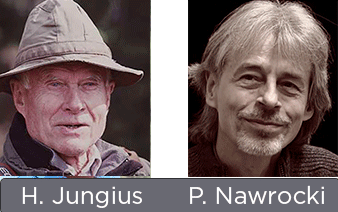
- This event has passed.
Hartmut Jungius Tree beekeeping (Zeidlerei) as a contribution to conservation of biodiversity and natural forest ecosystems – Przemek Nawrocki Experience from 15 years of tree beekeeping restoration in the Puszcza Pilicka Forest in central Poland.

Hartmut Jungius
Tree beekeeping (Zeidlerei) as a contribution to conservation of biodiversity and natural forest ecosystems
Most of our forests are shaped by intensive use. Natural dynamic processes and ecological and biological diversity are missing. In particular micro habitats such as hollow trees, root plates, dead wood and Phytotelmen, small bodies of water in trees. These habitats host hundreds of animal and plant species and microorganisms.
The traditional home of the honey bee is a hollow in an old tree. The whole biology of the species is adapted to this. Some of this diversity could be returned. by reactivating tree beekeeping (Zeidlerei), an old, but almost forgotten practice of sustainable resource use. It requires sustainable forest management and a highly diverse forest ecosystem, with old trees, into which the tree beekeeper (Zeidler) carves a hollow (Beute), as a nesting place for the honey bee. This traditional land and resource use system survived in the Ural. It is economically feasible, contributes to biodiversity, forest dynamics, a rich and diverse ecosystem and maintains a traditional for of land-use.
Przemek Nawrocki
Experience from 15 years of tree beekeeping restoration in the Puszcza Pilicka Forest in central Poland.
Tree beekeeping was once a very important sector of the economy in Poland. It disappeared at the end of the 19th century. The recreation of tree beekeeping in Poland began in 2006, among others, in the Puszcza Pilicka Forest. 15 years of experience allow us to answer several important questions. Can tree beekeeping in forests be a significant source of honey? Could tree beekeeping be a tool for the conservation of wild honeybees to create a self-sustaining population in forests? Can free living honeybees in the forest and bees in apiaries coexist harmoniously with each other, creating one local population? What should be the main role of a modern tree beekeeper?
Przemysław Nawrocki
Dr. sc.nat., Biologe, River & wetland ecology, WWF Poland
Biologist, specialist in river and wetland ecology, bird studies and nature conservation. Dr Nawrocki got a master’s degree from Poznań University and a PhD from Gdańsk University (both Poland). He has been working for WWF Poland since 1997, and is involved in various projects aimed at the conservation of river and forest ecosystems, combining nature conservation with local economy, ecological education and shaping Poland’s environmental policies. Przemek Nawrocki is one of the initiators of the restoration of tree-beekeeping in Poland. His free time he devotes to carving birds from wood and drawing pictures for wildlife publications.
To participate in the Zoom meeting (only in english), click here
ID de réunion : 825 6119 4208
Code secret : 649415
